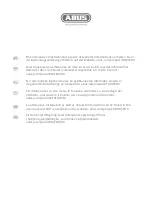
Operator's Manual
WP700Zi-OM-E-RevA
224
SPI Setup Mode
Select either Binary (Bin) or Hexadecimal (Hex) setup mode. The mode selected will propagate
through the entire SPI trigger setup.
Toggling back and forth between the modes will not result in loss of information (binary is used
internally as the core format for all triggering and decoding operations); though, use of "don’t
care" bits in a binary setup will result in the display of an X (for a full nibble "don’t care") or a $
(for a partial nibble "don’t care").
SPI Sources Setup
DATA and CLOCK
- The pop-up dialog is used to select the appropriate channel or EXT
input for each. Make sure that you have these selected correctly or your trigger may not
function.
Trig(ger) Threshold
- Adjust the vertical level for the trigger. Just as for an Edge trigger, you
must specify the level used in order to process the incoming signals and determine whether
the desired serial data pattern is meeting the set trigger condition. This value is used for both
DATA and CLOCK signals.
SPI Trigger Type Selection
The SPI trigger can be configured to trigger on simple conditions (i.e., the presence
of a START, STOP, RESTART bit, or the absence of an ACK bit (NO ACK). In
addition, more complex trigger conditions can be created using ADDR,
ADDR+DATA, FRAME LENGTH, or EEPROM setups.
If one of the more complex trigger conditions is selected, reference the sections
below for information on
Address
and
Data Pattern
setup.
SPI Address Setup
This setup selections are displayed if you select ADDR, ADDR+DATA, FRAME LENGTH, OR EEPROM Trigger
Selections.
Address Length
- SPI utilizes either 7-bit or 10-bit formats for the address,
depending on the device. Make the appropriate selection so as to be able to
enter the correct address value.
If 7-bit address length is selected, another selection will appear for whether
the Read/Write bit should be included as part of the address value entered.
For instance, some engineers think of the address pattern as including the
R/W bit (i.e., 8 bits) and others think of the address pattern as not including
the R/W bit (i.e., 7 bits). Touch the checkbox if you want to include the R/W
bit in your entered Address value. If this is done, then the "Direction" value
Summary of Contents for DDA 7 Zi series
Page 1: ...Operator s Manual WavePro SDA and DDA 7 Zi Series Oscilloscopes ...
Page 2: ... L R R H HUD RU D D ...
Page 41: ...Operator s Manual WP700Zi OM E RevA 40 The detachable WavePro Zi front panel ...
Page 376: ...WavePro 7Zi 375 WP700Zi OM E RevA Absolute Offset Relative ...
Page 439: ...Operator s Manual WP700Zi OM E RevA 438 ...
Page 440: ...WavePro 7Zi 439 WP700Zi OM E RevA ...
Page 544: ...Thank you for purchasing a WavePro SDA or DDA 7 Zi Oscilloscope ...
















































